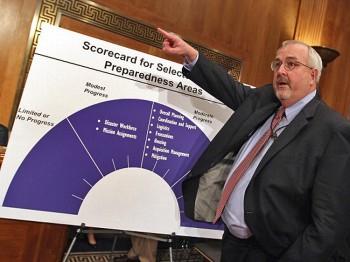CAMBRIDGE, Mass.—The recent spike of arbitrary arrests, forced disappearances, and ill treatment of human rights lawyers and activists by Chinese authorities has aroused great concern in the international community. In response, the Harvard University Human Rights Journal’s 10th annual symposium dedicated this year’s meeting to these courageous individuals. Speakers examined strategies other governments, civil societies, and overseas rights groups might adopt to engage with China and ameliorate flagrant abuses of power.
The conference’s panelists consisted of Harvard faculty and distinguished guests from the human rights community including pro-democracy activist Yang Jianli; Jeremy Daum of U.S.-Asia Law Institute of NYU; spokesperson for Falun Gong Erping Zhang; co-director of the Center on Law and Globalization Terrence Halliday; and Executive Director of HRIC Sharon Hom.
Participants described how the Chinese regime’s treatment of human rights lawyers and activists violates its nation’s own laws, and how these actions directly demonstrate Chinese authorities’ attitude toward a rule of law.
“The international community should support our colleagues in China and rule of law in China. It is not just for 1.3 billion people—while it has an impact for the region, it also has an impact on the world,” said Hom. “If China does not become more democratic and does not respect the rule of law, and Chinese lawyers cannot function independently or access information, the consequences will affect everyone in the international human rights system. This affects everyone. If we care about social justice for the Chinese, then we care about social justice everywhere, because it is interrelated.”
Hom explained that, at heart, what the West means by “rule of law” is not the same thing the Chinese Communist Party (CCP) means by “rule of law.” While the Chinese government intends to rule the country by laws, they do not mean that everybody in the country, most notably the Party and its authorities, have to follow these laws.
Hom said many of the public defenders she worked with are often told by the police or authorities that they are above the law. “Rights? Law? I’ll tell you who the law is. I am the law.” They are told this many times.
“If that is the context then what role should the international community play?” Hom asked. She said there are four levels of engagement. They are the domestic level, international level, Chinese civil society, and cyberspace.
Hom said there are 400 million computer users who access the Internet in China and 800 million cell phone users, half of whom have phone access to the Internet. Cyberspace is where rights defenders are able to operate, publish, and organize, but also, unfortunately, where they can be caught. Their activities are often documented online. The online world blurs the line between inside China and outside China.
Issues such as the environment, forced relocations, the tainted milk scandal, and police brutality are Tweeted, written about, and blogged about, in forums and in online videos. It is what the defenders use to organize and broadcast out to the international community to inspire support. Petitions, open letters, and legal documents are made public.
Hom said the Chinese authorities understand that the Internet was designed to be an open information system, so they have developed a strategy to control it. They know what the defenders are up against, what kind of climate they are operating under. They are not only able to monitor and filter information but also influence online discussions with a very nationalistic voice.
According to Hom, when the international community engages with China, as academics, and in the bilateral Sino-U.S. relationship, or when the U.N. engages with China, interventions have failed. “The international community does not have a good strategy to deal with China. It does not have an effective strategy and hasn’t been effective in its interventions,” said Hom.
When interacting with China’s human rights lawyers, Hom says that there are two things to consider. First, lawyers need a safe and independent space where freedom of expression and information access can be promoted; this is key.
Secondly, they need to be shown how to use the international human rights mechanism more effectively. In the past five years there has been a proliferation of human rights courses in universities across China. Instead of just learning theories, Hom said, it would be helpful to offer a clinical hands-on training so that individuals may, for example, learn how to submit a case package to the U.N. Human Rights Working Group for Arbitrary Detention and perform other functions that require technical rigor.
China’s attack on lawyers and activists is nothing new, but for decades the force aimed at these individuals has fluctuated. However, recent months have seen some of the most severe crackdowns since 1989, in part fueled by the Chinese regime’s fear of the Jasmine Revolution.
Halliday said that a disproportionate number of human rights lawyers in China are Christians. It is hard to imagine how they can keep up their resolve in the face of risking repeated harsh punishments. Hom attributed this steadfastness to a very powerful sense of humor, satire, and solidarity, as well as an overwhelming sense of what the Christian lawyers call “answering the call of conscience.”
The numbers of those in China needing the assistance of human rights lawyers is huge.
Halliday asserts that Christians today number between 50–70 million in China.
In early 1999 Falun Gong (also known as Falun Dafa) practitioners numbered 100 million. Since the persecution of Falun Gong began in July 1999, estimating the number of people who have adhered to Falun Gong is very difficult. Based on an estimate of those who are in touch with a network of Falun Gong practitioners inside China, the Falun Dafa Information Center estimates at least 20 million-40 million are still practicing Falun Gong.
Falun Gong is a spiritual and meditation practice whose popularity became a trigger for the Chinese authorities’ attempt to “eradicate” the practice. A letter from then-paramount leader Jiang Zemin dated April 25, 1999, indicates that he saw the spiritual teachings of Falun Gong in direct competition with the atheism promoted by the CCP.
There are also countless millions who have been denied the right to live and work in China’s cities, had their homes or farmland taken with little or no compensation, suffered the effects from environmental pollution, or otherwise been disadvantaged. Then there are the Tibetans with a population of 5.4 million and the Uyghurs with a population of 8.4 million. The persecution of these peoples is well documented.
The conference’s panelists consisted of Harvard faculty and distinguished guests from the human rights community including pro-democracy activist Yang Jianli; Jeremy Daum of U.S.-Asia Law Institute of NYU; spokesperson for Falun Gong Erping Zhang; co-director of the Center on Law and Globalization Terrence Halliday; and Executive Director of HRIC Sharon Hom.
Participants described how the Chinese regime’s treatment of human rights lawyers and activists violates its nation’s own laws, and how these actions directly demonstrate Chinese authorities’ attitude toward a rule of law.
“The international community should support our colleagues in China and rule of law in China. It is not just for 1.3 billion people—while it has an impact for the region, it also has an impact on the world,” said Hom. “If China does not become more democratic and does not respect the rule of law, and Chinese lawyers cannot function independently or access information, the consequences will affect everyone in the international human rights system. This affects everyone. If we care about social justice for the Chinese, then we care about social justice everywhere, because it is interrelated.”
Hom explained that, at heart, what the West means by “rule of law” is not the same thing the Chinese Communist Party (CCP) means by “rule of law.” While the Chinese government intends to rule the country by laws, they do not mean that everybody in the country, most notably the Party and its authorities, have to follow these laws.
Hom said many of the public defenders she worked with are often told by the police or authorities that they are above the law. “Rights? Law? I’ll tell you who the law is. I am the law.” They are told this many times.
“If that is the context then what role should the international community play?” Hom asked. She said there are four levels of engagement. They are the domestic level, international level, Chinese civil society, and cyberspace.
Hom said there are 400 million computer users who access the Internet in China and 800 million cell phone users, half of whom have phone access to the Internet. Cyberspace is where rights defenders are able to operate, publish, and organize, but also, unfortunately, where they can be caught. Their activities are often documented online. The online world blurs the line between inside China and outside China.
Issues such as the environment, forced relocations, the tainted milk scandal, and police brutality are Tweeted, written about, and blogged about, in forums and in online videos. It is what the defenders use to organize and broadcast out to the international community to inspire support. Petitions, open letters, and legal documents are made public.
Hom said the Chinese authorities understand that the Internet was designed to be an open information system, so they have developed a strategy to control it. They know what the defenders are up against, what kind of climate they are operating under. They are not only able to monitor and filter information but also influence online discussions with a very nationalistic voice.
According to Hom, when the international community engages with China, as academics, and in the bilateral Sino-U.S. relationship, or when the U.N. engages with China, interventions have failed. “The international community does not have a good strategy to deal with China. It does not have an effective strategy and hasn’t been effective in its interventions,” said Hom.
When interacting with China’s human rights lawyers, Hom says that there are two things to consider. First, lawyers need a safe and independent space where freedom of expression and information access can be promoted; this is key.
Secondly, they need to be shown how to use the international human rights mechanism more effectively. In the past five years there has been a proliferation of human rights courses in universities across China. Instead of just learning theories, Hom said, it would be helpful to offer a clinical hands-on training so that individuals may, for example, learn how to submit a case package to the U.N. Human Rights Working Group for Arbitrary Detention and perform other functions that require technical rigor.
Chinese Civil Society
China’s attack on lawyers and activists is nothing new, but for decades the force aimed at these individuals has fluctuated. However, recent months have seen some of the most severe crackdowns since 1989, in part fueled by the Chinese regime’s fear of the Jasmine Revolution.
Halliday said that a disproportionate number of human rights lawyers in China are Christians. It is hard to imagine how they can keep up their resolve in the face of risking repeated harsh punishments. Hom attributed this steadfastness to a very powerful sense of humor, satire, and solidarity, as well as an overwhelming sense of what the Christian lawyers call “answering the call of conscience.”
The numbers of those in China needing the assistance of human rights lawyers is huge.
Halliday asserts that Christians today number between 50–70 million in China.
In early 1999 Falun Gong (also known as Falun Dafa) practitioners numbered 100 million. Since the persecution of Falun Gong began in July 1999, estimating the number of people who have adhered to Falun Gong is very difficult. Based on an estimate of those who are in touch with a network of Falun Gong practitioners inside China, the Falun Dafa Information Center estimates at least 20 million-40 million are still practicing Falun Gong.
Falun Gong is a spiritual and meditation practice whose popularity became a trigger for the Chinese authorities’ attempt to “eradicate” the practice. A letter from then-paramount leader Jiang Zemin dated April 25, 1999, indicates that he saw the spiritual teachings of Falun Gong in direct competition with the atheism promoted by the CCP.
There are also countless millions who have been denied the right to live and work in China’s cities, had their homes or farmland taken with little or no compensation, suffered the effects from environmental pollution, or otherwise been disadvantaged. Then there are the Tibetans with a population of 5.4 million and the Uyghurs with a population of 8.4 million. The persecution of these peoples is well documented.


